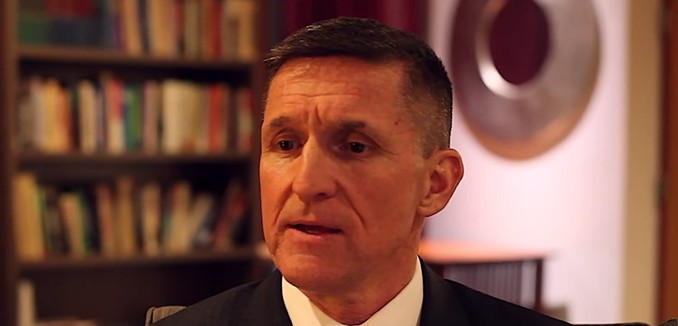The United States gets “nothing but grief” from the nuclear deal with Iran, the former head of U.S. military intelligence said today.
Lt. Gen. (ret.) Michael Flynn, who served as the head of the Defense Intelligence Agency from 2012 to 2014, said in an interview published on the website Medium that the deal could lead to the attempted elimination of Israel, a “large regional war” between Iran and Saudi Arabia, and a future in which Iran “can become even more hardline and crush all efforts at democracy and freedom. There is no longer a penalty for their harsh behavior towards their citizens.”
Flynn stated that Arab allies told him that they “feel abandoned by the U.S.” and have lost their trust in the government. Flynn expressed concern that these states would seek to develop their own nuclear programs, and, if Iran develops a nuclear weapon, take similar steps towards weaponization.
When asked what Iran’s negotiating partners achieved by striking the deal, Flynn explained that the U.S. achieved very few positives:
Let’s start with Europe. Europe, Russia, and China get three big things: 1. A new market of 80 million people to buy their goods; 2. Cheap oil; and 3. An educated work force to open companies within Iran.
The U.S. gets nothing but grief. We did not get an apology for the 500 KIA and thousands of wounded military members in the Iraq war struck with Iranian explosively-formed penetrator IEDs. No apology for the hundreds of Marines killed in Beirut in the 1980s. None of the four current American hostages were released. No apology for the Americans killed in the Khobar tower terrorist attack. We did get a requirement to expand our security umbrella in the region for life. China will take the economic benefits and we will be stuck securing the region for the Chinese and Russians while the UN (IAEA) tries to monitor the Iranian nuclear advances that have historically failed.
Russia was the chief non-Iranian beneficiary of the deal, “knowing that they can also sell to the Iranian antagonists in the region and make double the money on arms and nuclear technology.” Flynn also predicted that Iran Iran would its economic windfall, achieved through sanctions relief and increased commerce, to finance its military, its terrorist proxies, and the Islamic Revolutionary Guard Corps, including the IRGC’s “narcotics cartel that stretches from Colombia and Venezuela to Afghanistan.”
At a June Congressional hearing, Flynn stated that the belief that a deal would change Iran’s domestic politics and regional strategy was “wishful thinking.”
[Photo: Harvard Institute of Politics / YouTube ]




